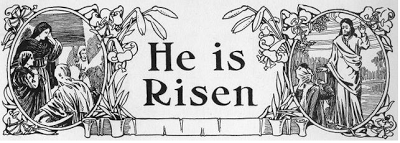 |
| Banner from The Children's Friend - Part 5 |
TO CHEW ON: “And their words seemed to them like idle tales, and they did not believe them.” Luke 24:11
Joanna woke before it was light. Her first moments in the sweet forgetfulness of just-waking were pleasant. But then the heavy sense of something wrong returned. Oh yes. Jesus, her rabbi, friend and hero, was dead.
Ugly scenes replayed in her memory: Word that Jesus had been arrested. The terrifying bloodthirsty shouts of the mob. Jesus bruised, bloody and half-naked, dragging His cross through the city. Soldiers nailing Him to the wood and hoisting the structure upright on Golgotha. Hours hanging there. The uncanny darkness. His last agony-filled cries. His last labored breath. Dead.
Now she untangled herself from her coverings. It was early but their errand demanded the cover of pre-dawn darkness. She dressed then picked up the bundle of embalming spices and hurried out to meet the others at the appointed place.
Their discussion of their oversight to bring someone to roll away the heavy stone from the tomb entrance stopped as the site came into view. The mouth of the grave was black–open. What? Who?
They went in. No body. Instead, two men in shining clothes. Their words–“Why do you seek the living among the dead? He is not here but is risen!”– t took a while for them to sink in. It couldn’t be, could it?
Incredulous and filled with questions they returned to the others with the news of what they had seen and heard. Some recalled His predictions of just this happening. Others were suspicious of the Jews and the Romans. It took hours, days and numerous post-death appearances by Jesus before they were all convinced He really had risen.
The disciples’ reluctance to accept this incredible good news shouldn’t surprise us. For Jesus’ death and resurrection had changed everything – and it takes a while to recast paradigms and rebuild frames of reference. Now His teaching about the Kingdom of Heaven took on a new significance. His explanations of who He was and what He had come to accomplish began to make sense. He was a triumphant king, but in an altogether different way than they had expected Him to be. He had paid the price for sin. He had conquered death.
Joanna probably awoke the next morning – and the next and the next – with the sense you and I would feel on the morning after our favorite team had won the Stanley Cup, or the World Series, or the Brier or the Scotties, or we had just successfully birthed (after months of anticipation, and hours of painful labor) a baby!
PRAYER: Thank You, Jesus, for all that Your death and resurrection accomplished for the world – and for me. Please give me a greater appreciation for their meaning and significance. Amen.
MORE: “See What a Morning (Resurrection Hymn)” Stuart Townend
Today the church celebrates Easter. Ponder and enjoy the liturgy for Easter.
Do your 8-12-year-olds have daily devotions? Point them to Bible Drive-Thru.
***********
The Holy Bible, New King James Version Copyright © 1982 by Thomas Nelson, Inc. - Used with permission.













